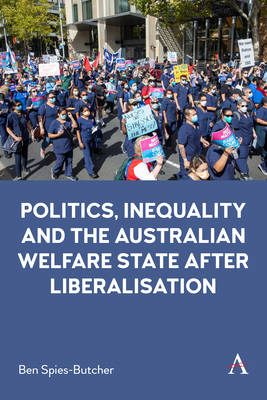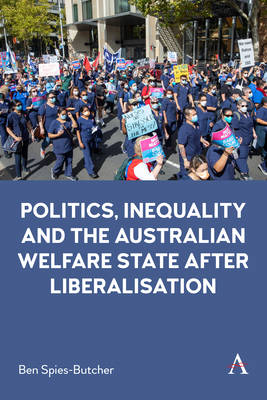
- Retrait gratuit dans votre magasin Club
- 7.000.000 titres dans notre catalogue
- Payer en toute sécurité
- Toujours un magasin près de chez vous
- Retrait gratuit dans votre magasin Club
- 7.000.0000 titres dans notre catalogue
- Payer en toute sécurité
- Toujours un magasin près de chez vous
Politics, Inequality and the Australian Welfare State After Liberalisation
Ben Spies-Butcher
185,45 €
+ 370 points
Description
Neoliberalism has transformed work, welfare and democracy. However, its impacts, and its future, are more complex than we often imagine. Alongside growing inequality, social spending has been rising. Politics, Inequality and the Australian Welfare State After Liberalisation asks how we understand this contradictory politics and what opportunities exist to create a more equal society. It argues an older welfare state politics, driven by the power of industrial labour, is giving way to political contests led by workers within the welfare state itself. Advancing more equal social policy, though, requires new forms of statecraft, or ways of doing policy, as well as new models of organising. Drawing on examples of social policy change since the 1980s, the book explores how seemingly similar reforms reflect distinct political dynamics and facilitate different social outcomes. The examples reflect the main aspects of liberalisation - conditionality of benefits, marketisation of services and financialisation of the life course. Across each domain, it identifies examples that fit the 'neoliberal' frame and alternatives that appear to subvert it. From family payments to Medicare, social protection advanced using remarkably similar policy tools to those associated with liberalisation. The book identifies two competing welfare state projects. A 'dual welfare state' of hidden subsidies to privatised welfare alongside increasingly residualised public systems that stigmatise recipients, and a 'hybrid' model of marketised universalism that uses novel forms of statecraft to socialise risk while advancing competition. Rather than explaining how Australia fell prey to neoliberalism, the book identifies an ongoing struggle between competing visions of liberalisation. Dual welfare deepens inequality by concealing the distributional effects of state policy, building a sizeable coalition of largely older voters, insulated from the insecurities of precarious work and benefiting from rising house prices. Hybrid policies, it argues, emerged at the intersection of sympathetic bureaucracies and strong social pressure. Central to both are workers within the welfare state and the unions that represent them. The analysis recasts divides based on generation and education as reflecting the increasingly central role of social reproduction within the paid economy, and the strategies of care workers to have their skills and value recognised. The analysis opens opportunities for new models of solidarity based on an ethic of care.
Spécifications
Parties prenantes
- Auteur(s) :
- Editeur:
Contenu
- Nombre de pages :
- 218
- Langue:
- Anglais
- Collection :
Caractéristiques
- EAN:
- 9781839988400
- Date de parution :
- 03-10-23
- Format:
- Livre relié
- Format numérique:
- Genaaid
- Dimensions :
- 152 mm x 231 mm
- Poids :
- 453 g

Les avis
Nous publions uniquement les avis qui respectent les conditions requises. Consultez nos conditions pour les avis.






